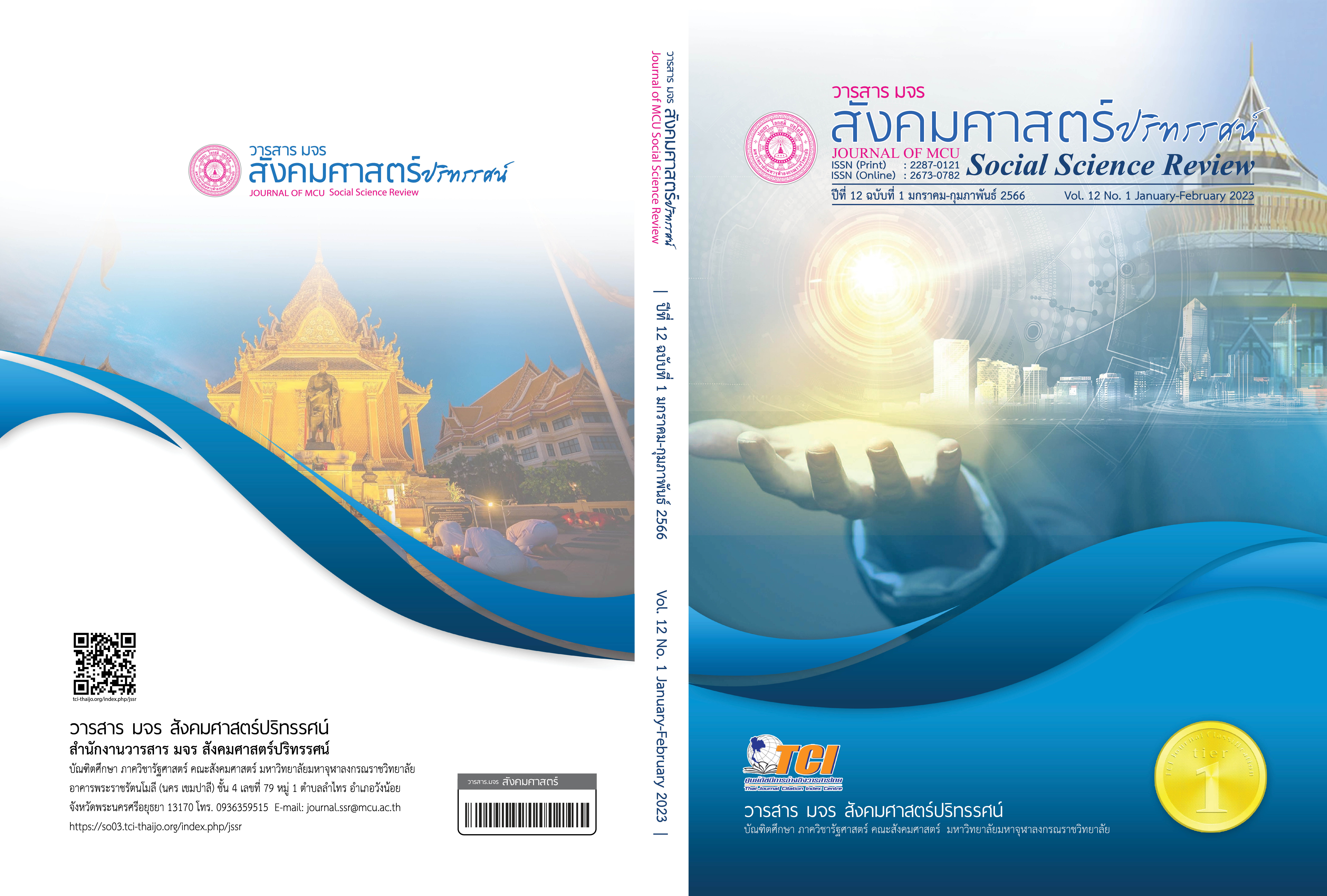POLITICAL COMMUNICATION COMPARISION OF DR. THAKSIN SHINAWATRA AND GENERAL PRAYUT CHAN-O-CHA
Keywords:
Comparison, Political communication, GovernmentAbstract
The objectives of this thesis were: 1. To study the political context 2. To compare political communication 3. To study the problems, obstacles and suggestions on political communication in the reign of Dr. Thaksin Shinawatra and in the reign of General Prayut Chan-o-cha. using qualitative research methods Data were collected by in-depth interviews with key informants from in-depth interviews of 3 monk and 15 people and collecting data from related documents and research. Qualitative Data Analysis Use content analysis methods and then present descriptively.
Findings were as follows: 1. During the year 2544-2546 B.E. was the period of 2001-2003 was the period when Dr. Thaksin Shinawatra came to administer the country under the constitutional rules of 2540 B.E., affecting political and social changes during the year 2557-2559 B.E. was a time of severe political crisis. Until General Prayut Chan-o-cha made a coup to take over the country. 2. Dr. Thaksin Shinawatra had knowledge and background in police service. and being a businessman and was elected as Prime Minister Therefore, it has the skills to communicate that is friendly to the people. General Prayut Chan-o-cha had knowledge and background from military service. Therefore, he was a stubborn, aggressive person, leading to a message of reform in many areas. 3. Problems, obstacles, and suggestions were found that Dr. Thaksin Shinawatra was sometimes quick-witted. may not be cautious in the use of language. He should communicate using more prudence. General Prayut Chan-o-cha is a straight-talker, speaks quickly, rarely keeps his emotions. should communicate in a friendly manner with the people.
References
กรกนก นิลดำ. (2558). การสื่อสารทางการเมืองของนายกรัฐมนตรีที่มาจากทหาร. (ดุษฎีนิพนธ์ปรัชญาดุษฎีบัณฑิต สาขาวิชาสื่อสารมวลชน). กรุงเทพฯ: มหาวิทยาลัยธรรมศาสตร์.
เขมา สมใจ. (2551). การสื่อสารทางการเมืองในวิกฤติการเมืองไทย ปี 2549 : ศึกษากรณีพันธมิตรประชาชนเพื่อประชาธิปไตย. (ดุษฎีนิพนธ์ปรัชญาดุษฎีบัณฑิต สาขาวิชาสื่อสารการเมือง). กรุงเทพฯ: มหาวิทยาลัยเกริก.
ทรงพล เขมะบุลกุล. (2558). การสื่อสารทางการเมืองของ ม.ร.ว.คึกฤทธิ์ ปราโมช : ศึกษาในห้วงเวลาปี พ.ศ. 2488-2538. (ดุษฎีนิพนธ์ปรัชญาดุษฎีบัณฑิต สาขาวิชาสื่อสารการเมือง). กรุงเทพฯ: มหาวิทยาลัยเกริก.
นนท์ชนันท์กรณ์ ฝ่ายเทศ. (2562). คุณลักษณะผู้นำทางการเมืองท้องถิ่นที่พึงประสงค์ตามหลักสัปปุริสธรรมของประชาชนในเขตเทศบาลเมืองแสนสุข จังหวัดชลบุรี. (สารนิพนธ์รัฐศาสตรมหาบัณฑิต สาขาวิชารัฐศาสตร์). พระนครศรีอยุธยา: มหาวิทยาลัยมหาจุฬาลงกรณราชวิทยาลัย.
นันทนา นันทวโรภาส. (2563). สื่อสารการเมือง: ทฤษฎีและการประยุกต์ใช้ (พิมพ์ครั้งที่ 3). พระนครศรีอยุธยา: โรงพิมพ์มหาจุฬาลงกรณราชวิทยาลัย.
ปิยะฉัตร ใหม่แก้ว. (2552). รูปแบบ เนื้อหา วิธีการนำเสนอ และวาทกรรมในรายการเปิดบ้านพิษณุโลก. (วิทยานิพนธ์นิเทศศาสตรมหาบัณฑิต สาขาวิชาการสื่อสารมวลชน).กรุงเทพฯ: จุฬาลงกรณ์มหาวิทยาลัย.
พรหมธิดา ทิพยานนท์. (2555). รูปแบบการบริหารจัดการรายการ ‘รัฐบาลยิ่งลักษณ์พบประชาชน’. (ในรายงานโครงการเฉพาะบุคคลนิเทศศาสตรมหาบัณฑิต สาขาวิชาการบริหารสื่อสารมวลชน. กรุงเทพฯ: มหาวิทยาลัยธรรมศาสตร์.
พระมหาสุขสันต์ สุเมธี (ธรรมมา). (2560). ภาวะผู้นำตามหลักสัปปุริสธรรมของผู้บริหารองค์การบริหารส่วนตำบลทางขวาง อำเภอแวงน้อย จังหวัดขอนแก่น. วารสาร มจร สังคมศาสตร์ปริทรรศน์, 6(2), 551-560.
ภาคภูมิ ศิริโรจน์วงศ์. (2561). การสื่อสารทางการเมืองของ จอมพลสฤษดิ์ ธนะรัชต์ : ศึกษาในห้วงเวลา พ.ศ. 2500-2506. (ดุษฎีนิพนธ์ปรัชญาดุษฎีบัณฑิต สาขาวิชาสื่อสารการเมือง). กรุงเทพฯ: มหาวิทยาลัยเกริก.
มหาวิทยาลัยมหาจุฬาลงกรณราชวิทยาลัย. (2539). พระไตรปิฎกภาษาไทย ฉบับมหาจุฬาลงกรณราชวิทยาลัย. กรุงเทพฯ: โรงพิมพ์มหาวิทยาลัยมหาจุฬาลงกรณราชวิทยาลัย.
ยุพดี วิภัติภูมิประทศ. (2558). การสื่อสารทางการเมืองของพลตรีจำลอง ศรีเมือง : ศึกษาในช่วงเวลาระหว่างปี พ.ศ.2523-2553 (ดุษฎีนิพนธ์ปรัชญาดุษฎีบัณฑิต สาขาวิชาสื่อสารการเมือง). กรุงเทพฯ: มหาวิทยาลัยเกริก.
วรัญญา ประเสริฐ. (2559). การสื่อสารทางการเมืองในรายการคืนความสุขให้คนในชาต ศึกษาระหว่างปีพ.ศ.2557-2559 (วิทยานิพนธ์รัฐศาสตรมหาบัณฑิต สาขาวิชาการปกครอง). กรุงเทพฯ: มหาวิทยาลัยธรรมศาสตร์.
วิชาญ จำปาขาว. (2554). การสื่อสารทางการเมืองของกลุ่มพันธมิตรประชาชนเพื่อประชาธิปไตย : ศึกษากรณีการชุมนุมประท้วงหลังการเลือกตั้ง 23 ธันวาคม 2550 (ดุษฎีนิพนธ์ปรัชญาดุษฎีบัณฑิต สาขาวิชาสื่อสารการเมือง). กรุงเทพฯ: มหาวิทยาลัยเกริก.
วีระยุทธ โชคชัยมาดล. (2558). กลยุทธ์การสื่อสารของพันตำรวจโท ดร. ทักษิณ ชินวัตร ในฐานะผู้นำรัฐบาลกับการใช้พื้นที่สาธารณะ. นิเทศศาสตรปริทัศน์, 19(1), 234-245.
สะถิระ เผือกประพันธุ์. (2554). การสื่อสารทางการเมืองของนายอุทัย พิมพ์ใจชน : ศึกษาในห้วงเวลาระหว่างปี พ.ศ. 2512-2549 (ดุษฎีนิพนธ์ปรัชญาดุษฎีบัณฑิต สาขาวิชาสื่อสารการเมือง). กรุงเทพฯ: มหาวิทยาลัยเกริก.
สุเทพ เดชะชีพ. (2547). การสื่อสารทางการเมืองของนายชวน หลีกภัย (ดุษฎีนิพนธ์นิเทศศาสตรดุษฎีบัณฑิต สาขาวิชาสื่อสารมวลชน). กรุงเทพฯ : มหาวิทยาลัยธรรมศาสตร์.
สุวรรณ์ แก้วนะ. (2564). การพัฒนาคุณลักษณะผู้นำตามหลักสัปปุริสธรรมของผู้บริหารเทศบาลในจังหวัดสมุทรปราการ. วารสาร มจร สังคมศาสตร์ปริทรรศน์, 10(3), 1-13.
เสถียร เชยประทับ. (2540). การสื่อสารกับการเมือง : เน้นสังคมประชาธิปไตย. กรุงเทพฯ: สำนักพิมพ์จุฬาลงกรณ์มหาวิทยาลัย.
เสรี วงษ์มณฑา. (2540). การประยุกต์ทฤษฎีในการสื่อสาร ในเอกสารการสอนชุดวิชาหลักและทฤษฎีการสื่อสาร หน่วยที่ 9-15 (พิมพ์ครั้งที่ 13). นนทบุรี: สำนักพิมพ์มหาวิทยาลัยสุโขทัยธรรมาธิราช.
Berlo, D. K. (1960). The Process of Communication : An Introduction to Theory and Practice. New York: Holt, Rinehart and Winston, 1960.
Deutsch, K. W. (1966). The Nerves of Government: Models of Political Communication and Control. New York: Free Press.
Downloads
Published
How to Cite
Issue
Section
License
Copyright (c) 2023 Journal of MCU Social Science Review

This work is licensed under a Creative Commons Attribution-NonCommercial-NoDerivatives 4.0 International License.
In order to conform the copyright law, all article authors must sign the consignment agreement to transfer the copyright to the Journal including the finally revised original articles. Besides, the article authors must declare that the articles will be printed in only the Journal of MCU Journal of Social Sciences. If there are pictures, tables or contents that were printed before, the article authors must receive permission from the authors in writing and show the evidence to the editor before the article is printed. If it does not conform to the set criteria, the editor will remove the article from the Journal without any exceptions.





